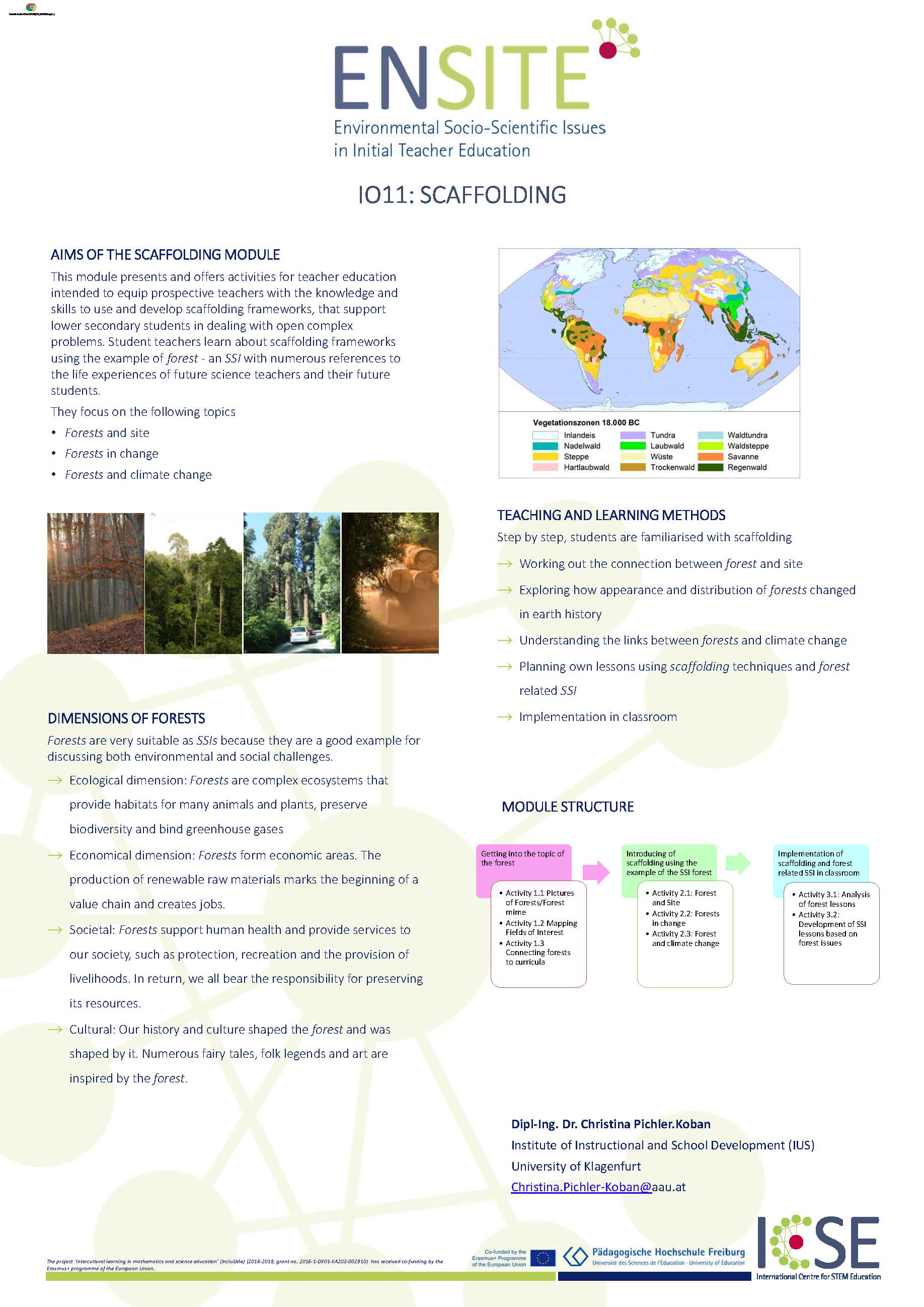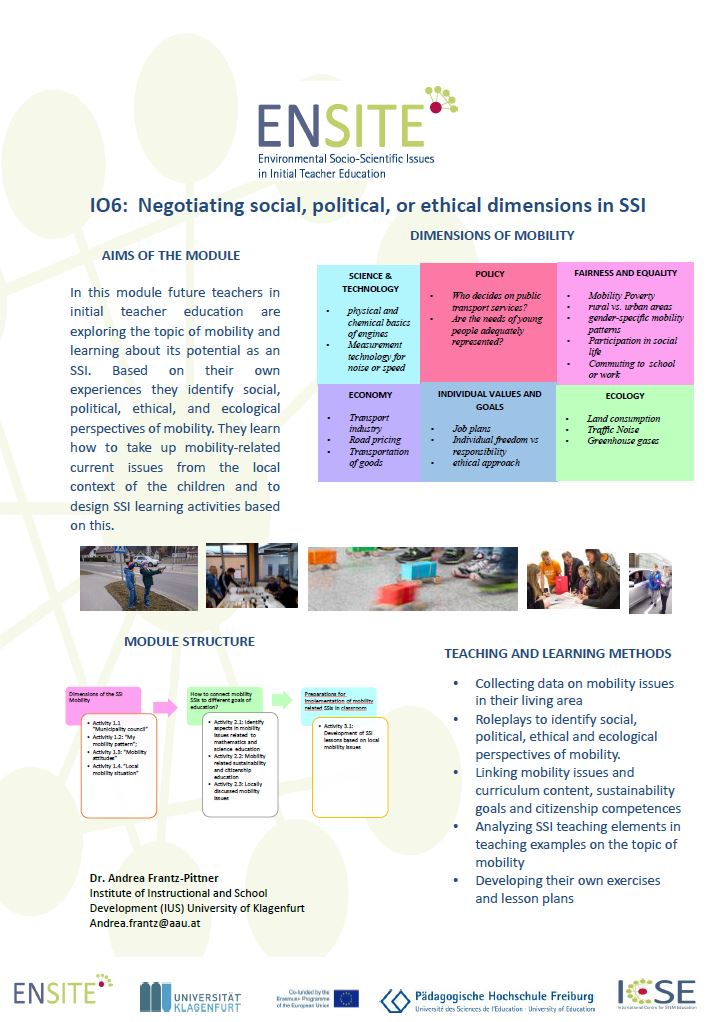Weiterqualifizierung für Lehrende an den Pädagogischen Hochschulen sowie Lehrkräfte in den Bereichen Fachdidaktik und Pädagogik, unter besonderer Berücksichtigung von Bildungsstandards und kompetenzorientiertem Unterricht.
Das Erasmus+ Projekt LINKS wird die internationale Vernetzung des Projekts IMST am Institut für Unterrichts- und Schulentwicklung in den kommenden drei Jahren verstärken. Das Akronym steht für Learning from Innovation and Networking in STEM und analysiert innovative Entwicklungen wie strategische Möglichkeiten in den gesellschaftlich relevanten Wissensfeldern Science, Technology, Engineering und Mathematics. Im internationalen Austausch untersucht und reflektiert das Projektteam wie die kontinuierliche Professionalisierung von Lehrenden in den MINT Fächern gelingen kann. Gemeinsam mit den neun Partnerorganisationen aus Frankreich, Italien, Finnland und Großbritannien wird am Austausch und an der Verbreitung innovativer guter Praxis gearbeitet. Nicht zuletzt ist es eines der Projektziele, Empfehlungen für die strategische Entwicklung des Politikfeldes zu formulieren und somit das gemeinsame europäische Netzwerk zu stärken.
Ziel: Auseinandersetzung mit zentralen gegenwärtigen und zukünftigen Entwicklungen des Fachunterrichts in Österreich, im Speziellen auf eine Stärkung der Kompetenz der Lehrpersonen, das eigene Fach im Kontext eines Fächerbündels zu verstehen und darauf aufbauend ein integratives Curriculum in einer fächerbezogenen Domäne zu entwickeln.
 The project „Developing Key Competences by Mathematics Education“ (KeyCoMath) aims at the development of students’ key competences in primary and secondary schools. Didactic concepts, teaching and learning material as well as corresponding assessment methods for mathematics education are developed, tested, evaluated and disseminated on the European level. „KeyCoMath“ uses the power of initial and in-service teacher education to put innovative pedagogical and didactical approaches into practice.
The project „Developing Key Competences by Mathematics Education“ (KeyCoMath) aims at the development of students’ key competences in primary and secondary schools. Didactic concepts, teaching and learning material as well as corresponding assessment methods for mathematics education are developed, tested, evaluated and disseminated on the European level. „KeyCoMath“ uses the power of initial and in-service teacher education to put innovative pedagogical and didactical approaches into practice.
Key competences are necessary for all citizens for personal fulfilment, active citizenship, social inclusion and employability in a knowledge society. The project „KeyCoMath“ develops, implements, and evaluates ways of working according to the “European Reference Framework of Key Competences for Lifelong Learning” in mathematics education.
„KeyCoMath“ aims at fundamental changes of pupils’ learning. A shift towards more active, exploratory, self-regulated, autonomous, communicative and collaborative learning is intended. This way of doing mathematics helps to develop a broad variety of key competences. Weitere Informationen finden Sie unter http://www.keycomath.eu/
STEM PD Net aims on improving quality of STEM teacher professional development (PD) delivered in Europe on a large scale and supporting STEM teaching through strengthening partnerships with and among PD practice.
To deal with the increasingly complex reality in class, which has accelerated in the last years, teachers need support through PD activities to adopt new integrative methods. This need is particularly pronounced in STEM teaching (Science, Technology, Engineering and Mathematics) since STEM is a field in which all pupils, including migrants or those from disadvantaged backgrounds, should acquire appropriate skills in order to ensure their participation in work and life.
Nowadays, the need for high-quality STEM teacher PD and the promotion of approaches that allow teachers to deal with complex classroom realities has been recognized. This can be seen in policy documents and reports such as the new Science Education for Responsible Citizenship (2015) report. It is also evidenced by the recent trend in Europe to establish PD centres to promote STEM teacher PD. What has not yet been achieved is to deliver the highest possible quality, based on findings from research, practice, different contexts, subjects and countries. Too often, therefore, PD activities do not lead to necessary changes in classroom practice.
Hence, our overall aim is to improve the quality and relevance of STEM teacher PD on a large scale, and to do so by strengthening the position, work and knowledge base of STEM PD centres across Europe: through transnational exchange and mutual learning in a stable European PD centre network, through linking research with practice, through developing urgently required ready-to-use
guidelines and reference materials for STEM PD providers.
To have the widest possible impact specialized STEM PD centres will be working together in this project and set up a European network. They are united by their mission to improve STEM teacher PD and bring together a wide range of different expertise.
The aims of the project are:
Improving quality of STEM teacher PD delivered in Europe on a large scale by:
(1) setting up research-based criteria for high-quality PD and enriching these with good-practice examples
(2) developing ready-to-use guidelines on how to feasibly measure the success of teacher PD in day-to-day settings as a mean of quality assurance in relation to (1),
(3) developing a catalogue for PD providers showcasing good-practice examples on how to prepare teachers to deal with diversity.
(4) collating a commented collection of STEM PD material allowing PD providers to easily find and select materials with a focus on their purpose, content, quality and potential.
Further Information: http://stem-pd-net.eu/en/project/
ENSITE (ENvironmental Socio-Scientific Issues in Initial Teacher Education) supports the development of future science and maths (from now on referred to as science) teachers’ environmental citizenship and related teaching competences.
 |  |
Weitere Projekte von Stefan Zehetmeier finden Sie in der Forschungsdokumentation.

